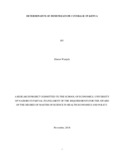Determinants of immunization coverage in Kenya
Abstract
The Division of Vaccines and Immunization under the ministry of health strives to ensure that
vaccines are available at all levels of the health care system. This is in line with the vision 2030
where all forms of health care services are available and affordable in order to improve the health
status of the people. This study is mainly concerned with establishing key factors that determine
utilization of immunization services in Kenya with evidence from Kenya Demographic and
Household Survey 2008-2009. Specifically, the study explores the pattern of children immunized
across different regions and estimates the factors that are necessary for usage of immunization
services in Kenya. Binary probit model has been used in estimation process. Age of the mother,
education levels, marital status, literacy levels, place of delivery, household size and birth order
are the study variables. The study results show that at 5% significance level, the age of the
mother, literacy levels, place of delivery, and birth order are significant factors that determine
utilization of immunization of services in Kenya. The study findings further indicate that the age
of the mother, literacy levels and place of delivery were positively related to the utilization of
immunization services in Kenya while birth order was found to be negatively related to
childimmunization. The study suggests that the ministry of health under which department of
immunization lies need to allocate a good proportion of their expenditure in educating people on
the importance of family planning as well as reproductive health to improve immunization
coverage in the long run.
Citation
Master of science in health economics and policyPublisher
University of Nairobi

